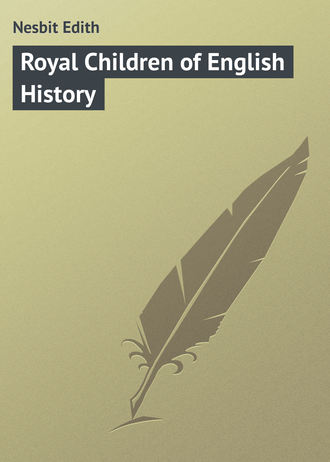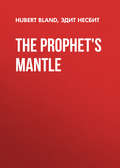
Эдит Несбит
Royal Children of English History
The First Prince of Wales
THERE were Welsh princes long before there were English kings, and the Welsh princes could not bear to be subject to the kings of England. So they were always fighting to get back their independence. But the English kings could not let them be free as they wished, because England could never have been safe with an independent kingdom so close to her. So there were constant wars between the two countries, and sometimes the fortune of battle went one way and sometimes the other.
But at last the Welsh Prince Llewellyn was killed. He had gone to the south of Wales to cheer up his subjects there, and he had crossed the river Wye into England, when a small band of English knights came up. A young knight named Adam Frankton met with a Welsh chief as he came out of a barn to join the Welsh army. Frankton at once attacked him, and after a struggle, wounded the Welsh chief to death. Then he rode on to battle, and when he came back he tried to find out what had become of the Welshman. He heard that he was already dead, and then they found that the dead man was the great Welsh Prince Llewellyn. His head was taken off and sent to London, where it was placed on the battlements of the Tower and crowned, in scorn, with ivy. This was because an old Welsh magician, years before, had said that when English money became round, the Welsh princes should be crowned in London. And money had become round in this way: —
Before this there were silver pennies, and when anyone wanted a half-penny, he chopped the silver penny in two, and if he wanted a farthing he chopped the silver penny in four, so that money was all sorts of queer shapes. But Edward the First had caused round copper half-pennies and farthings to be made, and when the Welsh prince had heard of this he had believed that the old magician's words were coming true, and that he should defeat Edward and become king of England himself. Instead of this, the poor man's head was cut off, and, in mockery of his hopes and dreams, they crowned the poor dead head with the wreath of ivy.
Now the Welsh wanted another prince, and King Edward said: "If you will submit to me and not fight any more, you shall have a prince who was born in Wales, can speak never a word of English, and never did wrong to man, woman, or child." The Welsh people agreed that if they could have such a prince as that, they would be contented and quiet, and give up fighting. And so one day the leaders of the Welsh met King Edward at his castle in Caernarvon and asked for the Prince he had promised them, and he came out of his castle with his little son, who had only been born a week before, in his arms.
"Here is your Prince," he said, holding up the little baby. "He was born in Wales, he cannot speak a word of English, and he has never done harm to man, woman or child."
Instead of being angry at the trick the king had played them, the Welsh people were very pleased. Welsh nurses took care of the baby, so that he really did learn to speak in Welsh before he could speak in English. And the Welsh were so pleased with their baby king that from that time Edward the First had no more trouble with them.
There are many stories told of this prince's boldness as a child. He promised them to grow up as brave as his father, and it would have been better for him if he had done so. He was always very fond of hunting, and once when he was quite young, he and his servants were hunting the deer. His servants lost the trace of the deer, and presently, when they reined up their horses, they found that the young prince was no longer with them. They looked everywhere for him, very frightened lest he should have fallen into the hands of robbers; and at last they heard a horn blown in the forest. They followed the sound of it and presently found that the young prince had seen which way the deer went, and had followed it and killed it all by himself.
Now King Edward the First had great trouble with his Scotch nobles, and many were the battles he fought with them, until at last he forced the Scottish king Balliol to declare himself his vassal, and he became the over-lord of Scotland. But there arose a brave Scot named William Wallace, who longed to see his country free from England, and he drove the English back, and again and again he beat them.
But in a few years Edward got together another army, and leading them into Scotland he beat the Scots and took Wallace prisoner. Wallace was tried and found guilty of treason, and when he had been beheaded, they crowned his head with laurel and placed it on London Bridge, for all the passers-by, by road or river, to see.
a. d. 1305
Then two men claimed the Scottish crown, Robert Bruce and John, who was called the Red Comyn. They were jealous of each other, and Bruce thought that Comyn had betrayed him. They met in a church to have an explanation.
"You are a traitor," said Bruce.
"You lie," said Comyn.
And Bruce in a fury struck at him with his dagger, and then, filled with horror, rushed from the church. "To horse, to horse," he cried. One of his attendants, named Kirkpatrick, asked him what was the matter.
"I doubt," said Bruce, "that I have slain the Red Comyn."
"You doubt!" said Kirkpatrick. "I will make sure."
So saying, he hurried back into the church and killed the wounded man.
And now the task of defending Scotland against Edward was left to Robert Bruce. King Edward was so angry when he heard of this murder, that at the feast, when his son was made a knight, he swore over the swan, which was the chief dish and which was the emblem of truth and constancy, that he would never rest two nights in the same place till he had chastised the Scots. And for some time the Scots and English were at bitter war, and when King Edward died, he made his son promise to go on fighting.
a. d. 1307
But Edward the Second was not a man like his father. He was more like his grandfather Henry the Third, caring for pretty colours and pretty things, rich clothes, rich feasts, rich jewels, and surrounding himself with worthless favourites. Robert Bruce said he was more afraid of the dead bones of Edward the First than of the living body of Edward of Caernarvon, and that it was easier to win a kingdom from his son than a foot of land from the father. Gradually the castles the English had taken in Scotland were won back from them. For twenty years the English had held the Castle of Edinburgh, and at the end of that time, Randolph, a Scottish noble, came to besiege it.
The siege was long, and the brave English showed no signs of giving in. Randolph was told that it was possible to climb up the south face of the rock on which the castle stood, and steep as the rock was, Randolph and some others began to climb it one dark night. When they were part of the way up, and close to the wall of the castle, they heard a soldier above them cry out – "Away, I see you," and down came stone after stone. Had many more been thrown Randolph and his companions must have been dashed to the ground and killed, for it was only on a very narrow ledge that they had found a footing. But the soldier was only in joke, trying to frighten his fellows. He had not really seen them at all, and he passed on. When all was quiet again, the daring Scots climbed up till they reached the top of the wall, and when they had fixed a rope ladder the rest of their men came up. Then they fell upon the men of the garrison and killed them, and the castle was taken by the Scots.
a. d. 1314
But a greater loss awaited the English. Edward led an English army to battle in Scotland; and at Bannockburn they met the force of the Scots king. They fought till the field was slippery with blood, and covered with broken armour and lances and arrows. Then at the last, as the English began to waver, Bruce charged down on them with more soldiers and utterly routed them. Edward with difficulty saved his life, and throughout England there were bitter lamentings at the loss and shame the country had suffered. Scotland was free from the English yoke, and of all the great conquests the first Edward had won, only Berwick-on-Tweed remained to the English.
Edward II. was never loved by his subjects. He made favourites of silly and wicked persons, and so gave much offence to good folk. He was wasteful and extravagant, and did not even try to govern the country wisely and well, while his favourites made themselves hated more and more by their dishonesty and wickedness. The last of his favourites was named Despenser, and he was as much hated by the Queen Isabella as by the lords and people of England. Despenser not only made himself hated by the queen, but he managed also to make her dislike her husband, the king, with whom she had long been on unfriendly terms. At last Isabella, disgusted with her husband and his favourite, ran away to France, and there, with the help of the Count of Hainault and other friends in England, she raised an army and attacked and defeated her husband and his favourite. The young Despenser was hanged on a gibbet fifty feet high, and a Parliament was called to decide what should be done with the king.
The Parliament declared its right to make or unmake kings, and ordered that Edward should not be king any more. Some members went to Edward at Kenilworth to tell him what they had decided, and Edward clad in a plain black gown, received them and quietly promised to be king no more. Then he was taken to Berkeley Castle, and a few months after the people learned that he was dead.
There has always been much doubt whether he died a natural death or was murdered. The Bishop of Hereford, who had always been on the queen's side, is said to have sent to two wicked men the following message written in Latin – "Edwardum occidere nolite timere bonum est." Now this message had two meanings according to the way the stops were put in. The first was – "Be unwilling to fear to kill Edward – it is good." The other was – "Be unwilling to kill Edward – it is good to fear."
So you see that, if this message fell into anyone's hands for whom it was not intended, the bishop would have been able to say he meant to warn people not to kill the king, while Gurney and Maltravers, who received the message, could say that the paper was an order to kill him. The story goes, that they came to the castle and there found the poor king in a dungeon. He was standing in mire and puddle, and, although he was a king, they gave him only bread and water. Then he thought of his former greatness and how brave and gallant a show he had made as a knight, and he cried out —
"Tell Isabel, the queen, I looked not thus
When for her sake I ran at tilt in France
And there unhorsed the Duke of Cleremont."
a. d. 1327
He was too weak to resist these wicked men, and they had no mercy in their hearts, but murdered him.







